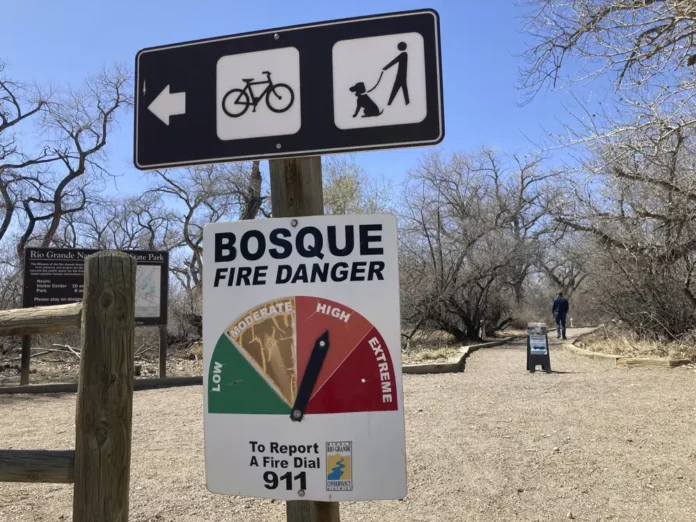
Snowcapped mountains in the Southwestern U.S. signal a possible delayed start to the wildfire season for some higher elevations, but officials in New Mexico and Arizona warned Wednesday that dry, windy conditions in other areas are increasing wildfire risks and prompting red flag warnings.
With leaves crunching under her feet and the wind starting to kick up, New Mexico’s governor warned that if the state wants to avoid a historic wildfire season like last year’s when more than 1 million acres (400,000 hectares) burned, she said everyone will have to be prepared.
“You can start to think about the landscape in New Mexico and the extreme drought here,” Gov. Michelle Lujan Grisham told those gathered at the Rio Grande Nature Center State Park. “We are at extreme risk.”
New Mexico is coming off a devastating wildfire season that included the largest blaze in the state’s recorded history — a conflagration sparked last spring by the U.S. government as forest managers were trying to clear out dead and overgrown vegetation in the foothills of the Rocky Mountains.
A pair of prescribed burn operations went awry, and fierce spring winds fueled the flames, displacing thousands of people and resulting in Congress approving nearly $4 billion in recovery funds. New Mexico lawmakers also recently passed legislation creating a low-interest loan program to help communities repair or replace public infrastructure damaged by wildfires or subsequent flooding.
The governor noted that Alaska was the only state to have more acres burned in 2022 than New Mexico.
New Mexico already has seen more than 100 fires this year, and officials in neighboring Arizona have reported responding to dozens of starts over the last month, all human-caused.
“We hope that’s not an indication of what’s to come, but with the heavy grass crop down there, we are staying vigilant and on alert,” Tiffany Davila with the Arizona Department of Forestry and Fire Management said of the southern part of the state.
New Mexico State Forester Laura McCarthy didn’t want to predict the kind of season the Southwest might see.
“If we’re learning anything from last year, it’s that the past is not really a good indicator of what’s coming in the future,” she said. “And I think that if we get two, three or four weeks of really hot, dry weather with winds, we’re right back in it.”
Aside from preparing firefighters and homeowners, McCarthy said state and federal land managers have a growing challenge to cut and remove overgrown brush and trees “on a scale we’ve never done before” that will include more prescribed burns and thinning projects.
The U.S. Forest Service, following a review last year, is implementing new policies and procedures for its prescribed fire operations. The planning process now includes a new template that calls for plans to be validated and updated to ensure that the information is current and the most recent science and modeling is incorporated.
For areas with a healthy snowpack, any fire activity in the high country may be delayed until late May into mid-June, which means the window for wildland fires could be shortened, Davila said.
Still, Davila joined New Mexico officials in urging caution, especially in those areas still mired in drought.
“Even with all of the snow and rain the state received, it is a temporary fix to a long-term drought issue,” she said.
Republished with the permission of The Associated Press.













